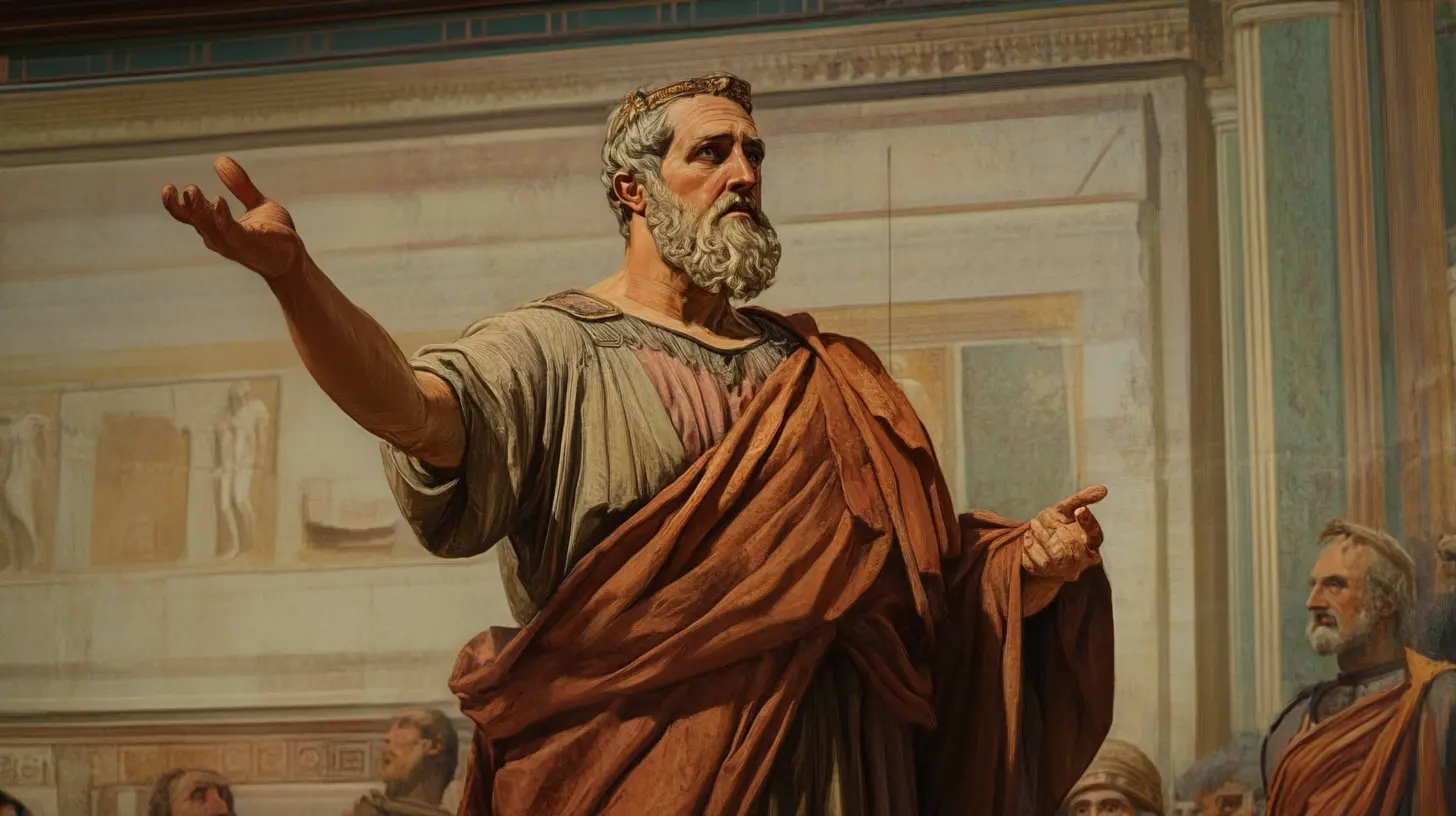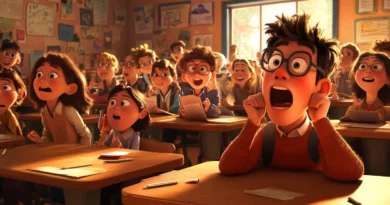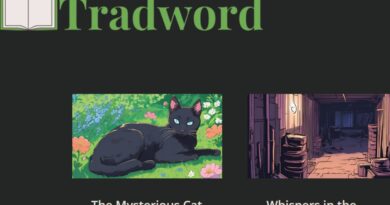Imagine uma palestra sobre educação que começa com cães e coelhos em gaiolas. Parece estranho? Foi exatamente assim que o legislador grego Licurgo iniciou sua apresentação, deixando todos perplexos. Através de uma demonstração surpreendente envolvendo esses animais, ele revelou uma poderosa verdade sobre o impacto da educação. Este conto não só desafia nossas percepções sobre o ensino e aprendizagem, mas também oferece uma perspectiva profunda sobre como a educação pode transformar vidas e, potencialmente, o mundo.
| Audio | |
|---|---|
Normal | Slow |
| English Transcript | Tradução |
| The Power of Education | O poder da educação |
| It is said that the legislator Lycurgus was invited to give a lecture on education. | Conta-se que o legislador Licurgo foi convidado a proferir uma palestra a respeito de educação. |
| He accepted the invitation but requested, however, a period of six months to prepare. | Aceitou o convite mas pediu, no entanto, o prazo de seis meses para se preparar. |
| This request caused some bewilderment, as everyone knew he was capable and ready to speak on the topic at any moment, which was why they had invited him. | O fato causou estranheza, pois todos sabiam que ele tinha capacidade e condições de falar a qualquer momento sobre o tema, e por isso o haviam convidado. |
| After six months had passed, he appeared before the assembly in anticipation. | Transcorridos os seis meses, compareceu perante a assembléia em expectativa. |
| He positioned himself at the podium, and shortly after, two servants entered, each carrying two cages. | Postou-se à tribuna e logo em seguida entraram dois criados, cada qual portando duas gaiolas. |
| In each cage, there was an animal: two hares and two dogs. | Em cada uma havia um animal, sendo duas lebres e dois cães. |
| At a previously agreed-upon signal, one of the servants opened the door of one of the cages, and the small white hare ran out, startled. | A um sinal previamente estabelecido, um dos criados abriu a porta de uma das gaiolas e a pequena lebre, branca, saiu a correr, espantada. |
| Immediately after, the other servant opened the cage containing the dog, which dashed out in a mad chase after the hare. | Logo em seguida o outro criado abriu a gaiola em que estava o cão e este saiu em desabalada correria ao encalço da lebre. |
| It skillfully caught and quickly slaughtered it. | Alcançou-a com destreza, trucidando-a rapidamente. |
| The scene was grotesque and shocked everyone. | A cena foi grotesca e chocou a todos. |
| Great admiration filled the assembly; their hearts seemed to leap from their chests. | Uma grande admiração tomou conta da assembléia os corações pareciam saltar do peito. |
| No one could understand what Lycurgus intended with such aggression. | Ninguém conseguia entender o que Licurgo desejava com tal agressão. |
| Even so, he said nothing. | Mesmo assim, ele nada falou. |
| He repeated the signal, and the other hare was released, followed by the other dog. | Tornou a repetir o sinal convencionado e a outra lebre foi libertada, seguida pela liberação do outro cão. |
| The people barely contained their breath. | O povo mal continha a respiração. |
| Some, more sensitive, covered their eyes to avoid seeing a repeat of the barbaric death of the defenseless little animal that ran and jumped across the stage. | Alguns, mais sensíveis, levaram as mãos aos olhos para não ver a reprise da morte bárbara do indefeso animalzinho que corria e saltava pelo palco. |
| At first, the dog lunged at the hare. | No primeiro instante, o cão investiu contra a lebre. |
| However, instead of biting it, it tapped it with its paw, and the hare fell. | Contudo, em vez de abocanhá-la, bateu-lhe com a pata e ela caiu. |
| Soon, the hare got up and began to play with the dog. | Logo a lebre ergueu-se e se pôs a brincar com o cão. |
| To everyone’s surprise, the two showed tranquil coexistence, hopping from one side of the stage to the other. | Para surpresa de todos, os dois ficaram a demonstrar tranqüila convivência, saltitando de um lado a outro do palco. |
| Then, and only then, did Lycurgus speak: "Gentlemen, you have just witnessed a demonstration of what education can do. Both hares are offspring of the same mother, were fed equally, and received the same care. Likewise, the dogs. The difference between the first pair and the second is simply education." | Então, e somente então, Licurgo falou: "Senhores, acabais de assistir a uma demonstração do que pode a educação. Ambas as lebres são filhas da mesma matriz, foram alimentadas igualmente e receberam os mesmos cuidados. Assim, igualmente, os cães. A diferença entre os primeiros e os segundos é, simplesmente, a educação." |
| He continued his speech passionately, discussing the virtues of the educational process: | E prosseguiu vivamente o seu discurso, dizendo das excelências do processo educativo: |
| "Education, based on a clear understanding of life, would transform the face of the world. Let us educate our children, enlighten their intelligence, but, above all, speak to their hearts, teaching them to rid themselves of their imperfections. Let us remember that wisdom in its highest form consists of becoming better." | "A educação, baseada numa concepção exata da vida, transformaria a face do mundo. Eduquemos nossos filhos, esclareçamos sua inteligência, mas, antes de tudo, falemos aos seus corações, ensinemos a eles a despojarem-se das suas imperfeições. Lembremo-nos de que a sabedoria por excelência consiste em nos tornarmos melhores." |
| Lycurgus was a Greek legislator who lived in the 4th century BC. | Licurgo foi um legislador grego que viveu no século IV antes de Cristo. |
| The verb "educate" originates from the Latin "educare" (or "educcere"), meaning "to draw out" or "to lead forth." It is thus understood that education is not merely the dispensing of information but rather the cultivation of the inner potential of a person so that it may flourish. | O verbo educar é originário do latim "educare" (ou "educcere"), e quer dizer "extrair", "conduzir adiante". Percebe-se, portanto, que a educação não se constitui em mero estabelecimento de informações, mas sim de se trabalhar as potencialidades interiores do ser, a fim de que floresçam. |
Contagem de palavras
A tabela abaixo exibe as palavras encontradas neste texto, bem como o número de vezes em que aparecem.
Veja também: Para que serve esta tabela?
| Freq. | Palavra | Freq. | Palavra | Freq. | Palavra |
|---|---|---|---|---|---|
| 47 | the | 19 | of | 13 | and |
| 12 | to | 9 | a | 8 | it |
| 7 | was | 7 | their | 7 | he |
| 6 | hare | 6 | education | 5 | two |
| 5 | that | 5 | in | 5 | at |
| 4 | other | 4 | one | 4 | lycurgus |
| 4 | is | 4 | dog | 4 | after |
| 3 | with | 3 | speak | 3 | out |
| 3 | on | 3 | from | 3 | everyone |
| 3 | but | 2 | which | 2 | what |
| 2 | us | 2 | then | 2 | stage |
| 2 | some | 2 | so | 2 | six |
| 2 | signal | 2 | servants | 2 | same |
| 2 | said | 2 | ran | 2 | or |
| 2 | opened | 2 | months | 2 | let |
| 2 | legislator | 2 | its | 2 | invited |
| 2 | however | 2 | hearts | 2 | hares |
| 2 | had | 2 | first | 2 | educate |
| 2 | each | 2 | dogs | 2 | cages |
| 2 | cage | 2 | assembly | 2 | animal |
| 1 | you | 1 | would | 1 | world |
| 1 | witnessed | 1 | wisdom | 1 | why |
| 1 | who | 1 | white | 1 | were |
| 1 | virtues | 1 | verb | 1 | upon |
| 1 | up | 1 | understood | 1 | understanding |
| 1 | understand | 1 | transform | 1 | tranquil |
| 1 | topic | 1 | thus | 1 | this |
| 1 | they | 1 | there | 1 | themselves |
| 1 | them | 1 | th | 1 | teaching |
| 1 | tapped | 1 | surprise | 1 | such |
| 1 | startled | 1 | speech | 1 | soon |
| 1 | small | 1 | slaughtered | 1 | skillfully |
| 1 | simply | 1 | side | 1 | showed |
| 1 | shortly | 1 | shocked | 1 | servant |
| 1 | sensitive | 1 | seemed | 1 | seeing |
| 1 | second | 1 | scene | 1 | s |
| 1 | rid | 1 | requested | 1 | request |
| 1 | repeated | 1 | repeat | 1 | remember |
| 1 | released | 1 | received | 1 | ready |
| 1 | rather | 1 | quickly | 1 | process |
| 1 | previously | 1 | prepare | 1 | power |
| 1 | potential | 1 | positioned | 1 | podium |
| 1 | play | 1 | person | 1 | period |
| 1 | people | 1 | paw | 1 | passionately |
| 1 | passed | 1 | pair | 1 | our |
| 1 | originates | 1 | only | 1 | offspring |
| 1 | nothing | 1 | not | 1 | no |
| 1 | mother | 1 | more | 1 | moment |
| 1 | merely | 1 | meaning | 1 | may |
| 1 | mad | 1 | lunged | 1 | lived |
| 1 | little | 1 | likewise | 1 | life |
| 1 | lecture | 1 | leap | 1 | lead |
| 1 | latin | 1 | knew | 1 | just |
| 1 | jumped | 1 | invitation | 1 | intended |
| 1 | intelligence | 1 | instead | 1 | inner |
| 1 | information | 1 | imperfections | 1 | immediately |
| 1 | hopping | 1 | his | 1 | himself |
| 1 | him | 1 | highest | 1 | have |
| 1 | grotesque | 1 | greek | 1 | great |
| 1 | got | 1 | give | 1 | gentlemen |
| 1 | forth | 1 | form | 1 | followed |
| 1 | flourish | 1 | filled | 1 | fell |
| 1 | fed | 1 | face | 1 | eyes |
| 1 | even | 1 | equally | 1 | entered |
| 1 | enlighten | 1 | educcere | 1 | educational |
| 1 | educare | 1 | draw | 1 | door |
| 1 | do | 1 | dispensing | 1 | discussing |
| 1 | difference | 1 | did | 1 | demonstration |
| 1 | defenseless | 1 | death | 1 | dashed |
| 1 | cultivation | 1 | covered | 1 | could |
| 1 | continued | 1 | containing | 1 | contained |
| 1 | consists | 1 | coexistence | 1 | clear |
| 1 | children | 1 | chests | 1 | chase |
| 1 | century | 1 | caused | 1 | caught |
| 1 | carrying | 1 | care | 1 | capable |
| 1 | can | 1 | by | 1 | breath |
| 1 | both | 1 | biting | 1 | bewilderment |
| 1 | between | 1 | better | 1 | began |
| 1 | before | 1 | becoming | 1 | bc |
| 1 | based | 1 | barely | 1 | barbaric |
| 1 | avoid | 1 | as | 1 | are |
| 1 | appeared | 1 | any | 1 | anticipation |
| 1 | an | 1 | all | 1 | agreed |
| 1 | aggression | 1 | admiration | 1 | across |
| 1 | accepted | 1 | above |










